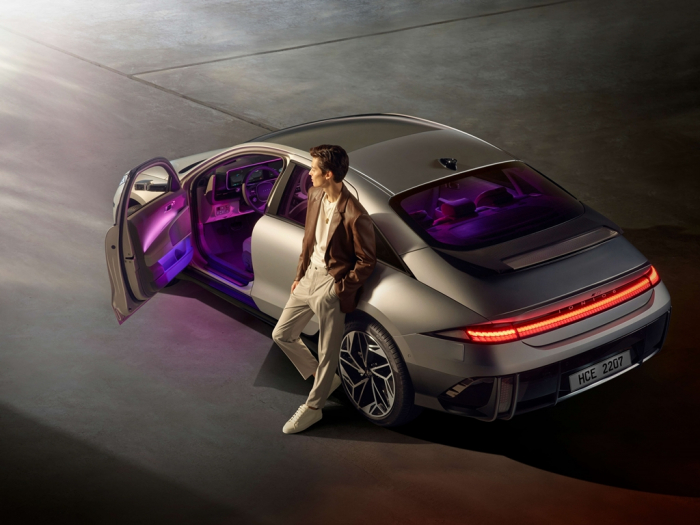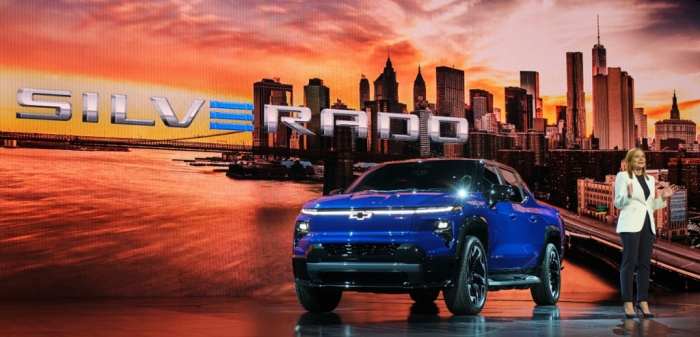Korean EV, battery makers to benefit from US inflation bill
The move is set to raise US EV sales overall but may disrupt the battery supply chain since the bill takes direct aim at China
By Aug 01, 2022 (Gmt+09:00)
LG Chem to sell water filter business to Glenwood PE for $692 million


Kyobo Life poised to buy Japan’s SBI Group-owned savings bank


KT&G eyes overseas M&A after rejecting activist fund's offer


StockX in merger talks with Naver’s online reseller Kream


Mirae Asset to be named Korea Post’s core real estate fund operator



South Korea’s electric vehicle and battery makers are expected to benefit from the Inflation Reduction Act of 2022, the US bill designed to bring rampant price hikes under control, as it is set to lift the 200,000-vehicle cap per manufacturer.
The bill, which is designed to provide incentives to companies that manufacture goods in the US with American parts and components, is likely to help not only Hyundai Motor Co. and Kia Corp. -- that plan to produce EVs there -- but also LG Energy Solution Ltd., SK On Co. and Samsung SDI Co., which are already operating and building battery plants in the US.
The Democrats in the US Senate are trying to pass the inflation bill that retains the EV tax credit of $7,500 per vehicle but removes the upper limit of 200,000 units that qualify for it, including plug-in hybrid electric vehicles (PHEVs), per carmaker.
The act, if approved, is expected to further boost EV vehicle sales in the world’s third-largest eco-friendly vehicle market since most carmakers have already reached the tax-incentive cap, industry sources said.
Tesla Inc., the world’s top EV maker, sold 1.3 million units in the first half, while General Motor Co. and Toyota Motor Corp. delivered 279,240 and 205,656 units, respectively. Ford Motor Co. is poised to hit the limit soon, selling 189,278 EVs in the first half.
Hyundai and Kia sold about 60,000 units, far lower than the cap, but the bill is expected to help them attract environmentally conscious customers.
“Rising EV demand overall is expected to bolster Hyundai and Kia’s sales,” said one of the sources.
ADVANTAGES FOR KOREAN BATTERY MAKERS VS CHINESE RIVALS
Growing EV demand is predicted to ramp up sales of batteries made by South Korean cell makers.
LG Energy, the world’s No. 2 battery maker last year, plans to start operations of its joint plant with GM in the third quarter. GM’s Silverado EV, an electric truck to be launched next year, already has more than 150,000 pre-orders. Ford’s F-150 Lightning, which is equipped with SK On’s battery, also logged more than 200,000 pre-orders.

South Korean battery makers are likely to gain the upper hand in competition with Chinese players as the provisions for the tax credit include conditions such as where raw materials are mined and refined, as well as where they are produced. A customer is eligible for $3,750, half the benefit, from 2024 only when they purchase an EV having batteries with more than 40% of raw materials such as lithium and nickel mined or smelted in the US or its free trade agreement (FTA) partners. The bar will be lifted to 80% in 2027.
The full tax credit will be applied to EVs having batteries with more than half their components made in North America. In 2029, all of the parts must be produced there for the benefit.
The move is to exclude Russia and China from the entire battery supply chain, industry sources said. The global top battery maker China’s Contemporary Amperex Technology Co. (CATL), and cell ingredient producers on the mainland will not benefit from the tax benefit, they added. On the other hand, EcoPro BM, South Korea’s top cathode material producer, POSCO Chemical Co. and LG Chem Ltd. are expected to enjoy the incentive.
But the bill may cause problems in the battery supply chain since China refines more than 70% of ores of cell materials such as lithium and nickel, some sources said.
Write to Hyung-Kyu Kim at khk@hankyung.com
Jongwoo Cheon edited this article.
-
 BatteriesLG Chem, GM in $30.6 billion EV battery materials supply deal
BatteriesLG Chem, GM in $30.6 billion EV battery materials supply dealJul 28, 2022 (Gmt+09:00)
2 Min read -

-
 BatteriesSK On to bolster US business with Ford's EV pickup truck sales
BatteriesSK On to bolster US business with Ford's EV pickup truck salesMay 29, 2022 (Gmt+09:00)
2 Min read -
 BatteriesPOSCO, GM JV inks battery materials supply deal worth $16 bn
BatteriesPOSCO, GM JV inks battery materials supply deal worth $16 bnMay 27, 2022 (Gmt+09:00)
2 Min read -
 BatteriesSamsung SDI, Stellantis pick Indiana for US EV battery plant
BatteriesSamsung SDI, Stellantis pick Indiana for US EV battery plantMay 24, 2022 (Gmt+09:00)
1 Min read -
 Electric vehiclesHyundai to invest $10.5 bn in US EV, future mobility sectors
Electric vehiclesHyundai to invest $10.5 bn in US EV, future mobility sectorsMay 22, 2022 (Gmt+09:00)
5 Min read -
 EV BatteriesLG Energy, GM to build $2.6 bn battery plant in Michigan
EV BatteriesLG Energy, GM to build $2.6 bn battery plant in MichiganJan 26, 2022 (Gmt+09:00)
2 Min read -
 BatteriesGM, LG to build second US EV battery plant in Tennessee
BatteriesGM, LG to build second US EV battery plant in TennesseeApr 19, 2021 (Gmt+09:00)
2 Min read


